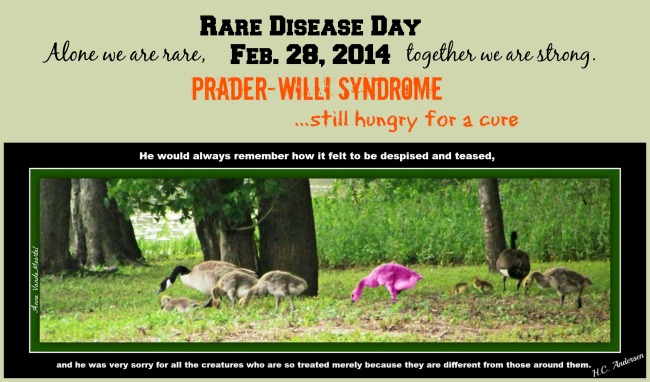Please click below to read. Thank you.
in the Dispatch
in the QC Times
in the Muscatine Journal
in the Sioux City Journal
in the Daily Nonpariel Council Bluffs.
in the Mason City Globe Gazette.
in the Waterloo Cedar Falls Courier
Please click below to read. Thank you.
in the Dispatch
in the QC Times
in the Muscatine Journal
in the Sioux City Journal
in the Daily Nonpariel Council Bluffs.
in the Mason City Globe Gazette.
in the Waterloo Cedar Falls Courier
click below to read in the Dispatch
click below to read in the Times
It’s here! Rare Disease Day. 10 facts you might not know about PWS:
random facts in no particular order gathered and shared by me
10. Prevalence: 1:15,000. [Anne’s note: we are some of the lucky ones who got a very early diagnosis. PWS was suspected for Katie at 4 days old]
9. The constant hunger of PWS is thought to be due to dysfunction of the hypothalamus and/or (not sure) disregulation of hormones of the gut. [Anne’s note: some describe it as “decreased satiation rather than increased hunger”…I never realized there was a difference…doesn’t not feeling satisfied mean feeling hungry? I don’t get it.]
8. The most common genetic cause of life-threatening childhood obesity is PWS.[Anne’s note: the good thing about the current, national hysteria over obesity is that PWS is getting some attention and being used as a “control” group in some hunger-related studies.]
7. Individuals with PWS typically have intellectual disabilities and exhibit more behavior issues compared to individuals with similar intellectual disability. [Anne’s note: I, too, have behavior issues when I am hungry.]
6.The constant need for behavioral management and food restrictions may cause stress for the family members. [Anne’s note: the use of the word “may” in this sentence cracked me up.]
5. PWS is a two stage syndrome. Stage one involves low muscle tone, feeding problems and poor weight gain in infancy. [Anne’s note: feeding “problems” become the main focus from the start. A cruel sense of humor has parents doing everything they can to get nourishment into their baby, only to have to restrict it in the next stage.]
4. Of people with PWS, 1 in 35 die from gastric rupture after eating too much in a short period of time. [Anne’s note: clearly the reason for vigilant supervision]
3. Speech, Occupational and Physical therapies are all beneficial for people with PWS. [Anne’s note: and if you are lucky enough to have a Lisa Nordstrom in your school district, a PH itinerant teacher is fantastic!]
2. Growth Hormone Therapy for PWS not only increases final height, but increases bone density, muscle mass,& stamina. [Anne’s note: thanks to Katie, who was a test subject for the research project discovering this]
1. More important than any of the facts you have just learned is this: There is LOVE! [Anne’s note: yes, there is love.]
Our adoption story
My journey as an adoptee who found her birth family.
Aspergers and the loss of my son
To every thing there is a season ~
Making the obvious more obvious
"Duchenning it" in my Twenties
What makes us different makes us great.
Just another WordPress.com site
a transparent peek into my journey... by Nicole Smith
Articulating a Rooted Life
Home of Gaydar Gone Wrong
Producer - Writer - Content Strategist
A Blog About Peyton Renee Snyder
The musings of a new mom learning to navigate marriage, parenthood, and the unexpected challenge of having a special needs child.
A Story about Love, Life & Prader-Willi Syndrome....
The Official blog of the Prader-Willi Syndrome Association (USA)
Life happens. You laugh about it or cry about it, sometimes both.
Choosing peace through beauty, nature, words.
Just another WordPress.com site
bits of taffy, about everything and yet nothing all at the same time!
Creating nutritious meals with the least amount of calories
an attempt at authentic awareness
a mamma and her boys